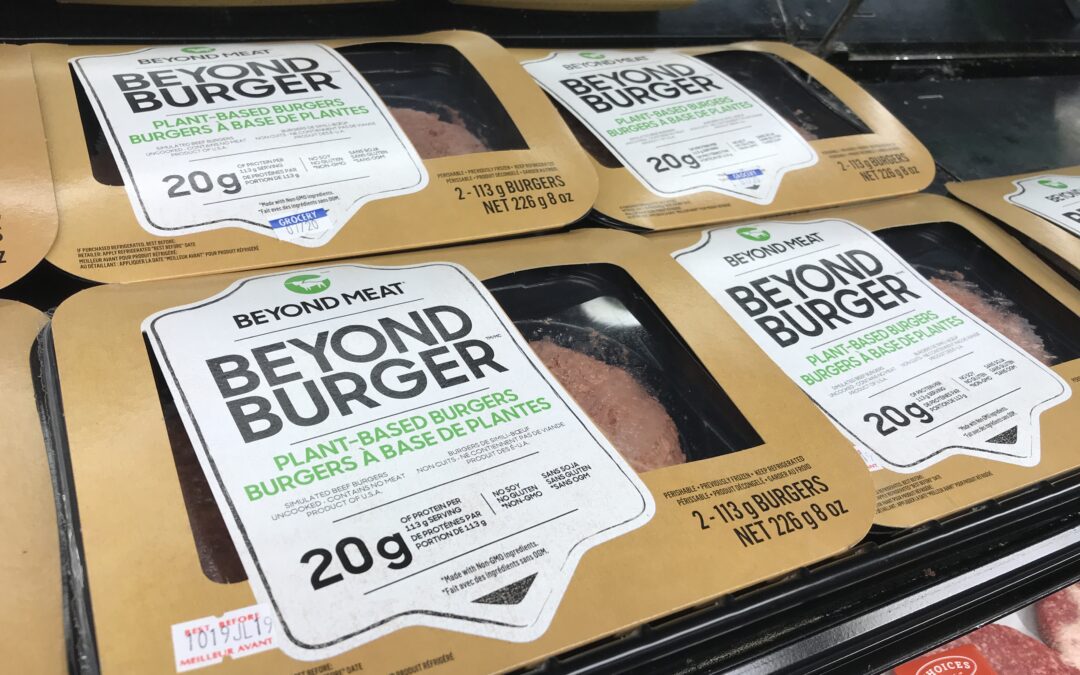Polish farmers have backed a proposal for the European Union to ban the use of words associated with meat in the marketing of vegetarian products.
Giving names like “burgers”, “sausages” and “steaks” to non-meat products would be prohibited under an amendment to regulations that is due to be voted on next week in the European Parliament.
The amendment would also expand an existing ban, in place since 2013, on describing plant-based alternatives to dairy as “milk”, “butter”, “cheese” or “yoghurt”. Under the new proposal, terms such as “cheese-like” or “yoghurt-style” would also be proscribed.
“Some food businesses implement advertising and marketing strategies that mislead consumers by trying to sell vegan or vegetarian products as substitutes for meat products,” warns Marian Sikora, head of the Federation of Trade Associations of Agricultural Producers (PFPŻ).
His organisation, which represents 28 Polish agricultural associations, claims that not only can this harm consumers, but that it also threatens culture heritage.
“The names of meat are deeply rooted in our cultural heritage…[and] have been shaped by centuries of hard work by farmers and butchers,” writes the PFPŻ, quoted by Business Insider Polska.
“These names did not so far need any protection…[because] nobody needed to be told what they are,” continues the statement. “[But] the imitation industry has used a loophole in European legislation to capture these common terms for its own benefit…[and] the fate of our common heritage is at stake.”
The PFPŻ has also declared that it will take part in the EU-wide “Ceci n’est pas un steak” (“This is not a steak”) campaign run by COPA-COGECA, an umbrella group of European farmers.
The debate on meat & dairy denominations for plant-based imitations is far more complex than it seems at first glance!#cecinestpasunsteak ❌campaign raises fundamental Qs⁉️about consumer information, cultural heritage & the power of modern marketing👇
➡️https://t.co/4JVNUJNHkr pic.twitter.com/tvbWzdNNj4
— COPA-COGECA (@COPACOGECA) October 6, 2020
The amendment has been backed by the European Parliament’s agriculture committee, and a vote is expected by the parliament as a whole on Tuesday or Wednesday. Observers say that the result could go either way, reports The Guardian.
There have also been strong voices of opposition to the amendment, with a public petition against it so far attracting over 200,000 online signatures.
Among those who have promoted the petition is Polish MEP Sylwia Spurek. She calls the proposed ban “an attack on the rights of consumers, a step back in the fight against the climate crisis, and acquiescence in further violations of animal rights”.
Poprawki "veggie burger" to uderzenie w prawa konsumentek/ów, to krok w tył w walce z kryzysem klimatycznym i przyzwolenie na dalsze łamanie praw zwierząt. Nie zgadzam się na to, żeby PE przykładał do tego rękę. Wspieram petycję @ProVeg_Inthttps://t.co/ifPqnpcExU
— Sylwia Spurek (@SylwiaSpurek) October 16, 2020
Spurek is a prominent advocate of veganism who has called for “making the production of animal products more difficult and expensive”. She drew criticism last year for a tweet that likened the treatment of animals to the Holocaust.
A group of 13 NGOs has also submitted a letter to MEPs urging them to vote against the amendment next week, arguing that it would contravene EU objectives to create healthier and more sustainable food systems and eating habits.
The claim that consumers are confused by plant-based products being given meat-like named is “clearly nonsense”, says Jasmijn de Boo of ProVeg International, quoted by The Guardian. “Consumers know exactly what they are getting, just as we all know there is no butter in peanut butter.”
The NGOs point to a recent survey in 11 EU countries the European Consumer Organisation which found that only 20% of the public favour a ban on using meat-related names for vegetarian products.
A majority, 69%, believe using such names should be allowed, though with most of them saying that such products should be clearly labelled as vegetarian.
Plant-based meat substitutes have been growing rapidly in popularity in Poland in recent years, with even many of the country’s biggest meat producers now offering vegan and vegetarian ranges.
Earlier this year, a survey found that 8.4% of Polish adults had followed a vegetarian (6.6%) or vegan (1.8%) diet in the preceding month. Among those who ate meat, 38.5% said they had made effort to limit their consumption. One third said that they ate vegetarian burgers, sausages or nuggets occasionally, and 31% said they would like to try them.
Last year, Warsaw was named as the sixth most vegan-friendly city in the world by Happy Cow, the leading international guide for vegan restaurants. However, veganism has also faced a backlash from some conservatives in Poland, who see it as a threat to Polish traditions
You know Poland's changing when one of the country's biggest meat companies launches vegan kabanos pic.twitter.com/VffehfhQlt
— Daniel Tilles (@danieltilles1) October 1, 2020
Main image credit: UBC Media Relations/Flickr (under CC BY 2.0)

Juliette Bretan is a freelance journalist covering Polish and Eastern European current affairs and culture. Her work has featured on the BBC World Service, and in CityMetric, The Independent, Ozy, New Eastern Europe and Culture.pl.




















